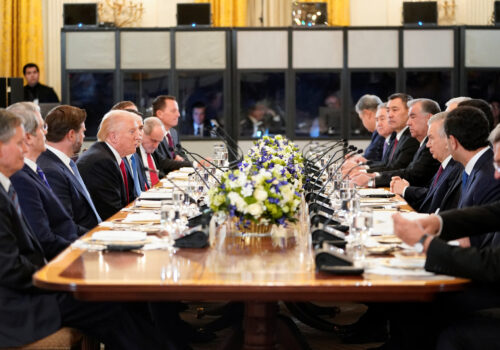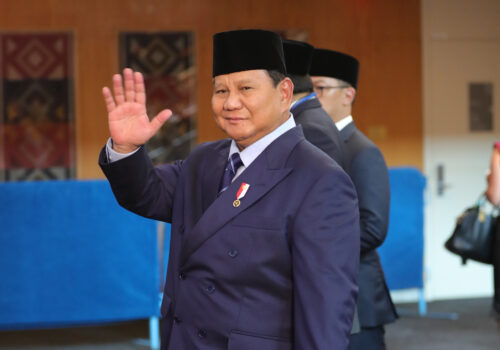Kazakhstan joins the Abraham Accords—and redefines the geography of peace
Five years after the Abraham Accords reshaped Middle Eastern diplomacy, a new and unexpected player has joined the circle. On Thursday, the White House announced that Kazakhstan, a Muslim-majority nation of twenty million on the Central Asian steppe, will become the first post-Soviet state to join the pact with Israel. The move reinvigorates an initiative that had slowed in recent years—and hints at a broader US strategy linking the Middle East and Eurasia.
US President Donald Trump officially announced the news in a Truth Social post. By joining the United Arab Emirates, Bahrain, Morocco, and Sudan, Kazakhstan is signaling its commitment to the principles of the accords. But it likely won’t be the last to join. Azerbaijan and Uzbekistan are in talks to join the pact.
The move highlights Central Asia’s somewhat quiet, but unusually strong, diplomatic ties with Israel, which are likely to increase should more regional nations follow in Kazakhstan’s footsteps. While some have dismissed an expansion to Central Asia as “largely symbolic,” this interpretation overlooks deeper implications.
Extending the Abraham Accords into Central Asia marks a new phase—building a coalition of pro-US Muslim nations committed to tolerance and engagement with Israel. Such a coalition strengthens efforts to counter extremism, particularly state-sponsored ideology from Iran, and fosters cooperation among US partners across a region vital to US interests.
Why Kazakhstan moved first—and who might follow
Trump has been eyeing an expansion of the Abraham Accords into Central Asia for months, while Israeli Prime Minister Benjamin Netanyahu has publicly appealed for “trilateral relations” among Israel, the United States, and Azerbaijan. Baku had appeared the most likely to join first, given its longstanding partnership with Israel across diplomacy, conflict mediation, defense, and energy.
Azerbaijan’s successful balancing of its Muslim identity with close ties to Israel has strengthened its access to Washington and set a precedent in the Turkic world. Kazakhstan likely coordinated with Azerbaijan, similar to how Saudi Arabia tacitly supported Bahrain joining in 2020.
Simultaneously, Kazakhstan’s move carries a competitive subtext vis-à-vis Uzbekistan. While the nations share fraternal ties, they compete for regional leadership and closer engagement with the West. This rivalry was on display when Uzbek President Shavkat Mirziyoyev committed to purchasing Boeing aircraft for eight billion dollars and was granted a sit-down meeting with Trump during the UN General Assembly—an opportunity that eluded Kazakh President Kassym-Jomart Tokayev. By contrast, Kazakhstan had earlier concluded a four-billion-dollar deal with US firm Wabtec to modernize its locomotive fleet—a significant but comparatively smaller deal.
By joining the Abraham Accords, Kazakhstan has bought Washington’s favor by aligning itself with US regional priorities and an initiative personally important to Trump.
Kazakhstan and Israel: A partnership rooted in tolerance and strategy
Kazakhstan’s ties with Israel are built on a tradition of coexistence and mutual respect. In 2023, former Israeli Ambassador Ran Ishay said that Kazakhstan is “a country without antisemitism,” a reputation echoed by diaspora Jewish leaders such as Malcolm Hoenlein.
Jewish traders first arrived along the Silk Road in what is now Kazakhstan as early as the fifteenth century. During Stalin’s forced deportations and World War II, Kazakhstan became home to over a hundred ethnic groups exiled from other parts of the Soviet Union, as well as tens of thousands of Jews fleeing Nazi persecution. Despite severe famine leading to the death of more than a third of the Kazakh population due to Soviet collectivization policies, these newcomers found relative safety and dignity in Kazakhstan—a legacy that endures today.
The relationship extends beyond tolerance, all the way to fashion trends. Three years ago, young Kazakhstani women took to wearing Hebrew pendants bearing the word chai—or life—displaying an appreciation of Jewish culture. Kazakhstan’s acceptance of Jews reflects its broader ethos of hospitality and religious tolerance. For example, Muslim Kazakhs often join their Orthodox Christian neighbors during the Epiphany holiday, plunging into icy waters to commemorate the baptism of Jesus.
Diplomatically, Israel was one of the first countries to recognize Kazakhstan’s independence in 1992, after which the two nations quickly established full relations. Since then, cooperation has grown steadily across several industries. Israeli know-how has helped Kazakhstan modernize its irrigation systems and healthcare sector, while Kazakhstan has become one of Israel’s top oil suppliers. Together with Azerbaijan, it provided roughly 60 percent of Israel’s energy needs as of 2023.
Kazakhstan’s relations with Israel have deepened even during moments of regional tension. Following the Hamas attacks of October 7, 2023, Tokayev became the first Central Asian leader to condemn the massacre, asserting that “terrorist tactics are never justified.” Days later, Astana called for the unconditional release of Israeli hostages held by Hamas. Rather than retreating from its partnership with Israel under pressure from Iran and segments of the Muslim world, Kazakhstan pursued discussions on visa-free travel, tourism, and technology partnerships. Knesset Speaker Amir Ohana visited Astana in April, praising Kazakhstan as a “model of peaceful coexistence and mutual respect.”
These warm relations carry risks. In August 2024, Iranian operatives attempted to target Israeli and Jewish institutions in Kazakhstan’s city of Almaty, including the Jewish Agency offices and the Or Avner Center. The attacks, carried out by a Tajik national recruited by Tehran, underscored the risks of Astana’s policy of religious tolerance and openness.
For Israel, Kazakhstan represents a stable, pragmatic partner—a Muslim-majority state that shares its concerns about extremism, and values practical cooperation over ideology. For Kazakhstan, ties with Israel offer not just technological and security dividends but also a bridge to the United States and global Jewish communities, with whom Astana has cultivated ties for years.
In an era of rising global antisemitism, Kazakhstan’s record is a model of harmony and pragmatic diplomacy, making accession to the Abraham Accords a logical extension of its history.
Kazakhstan’s role in US strategic interests
For Washington, Kazakhstan’s accession aligns with broader objectives—securing critical mineral supply chains and expanding access to the Trans-Caspian International Transport Route or Middle Corridor. The Middle Corridor, which connects Central Asia to Europe via the Caspian Sea and the South Caucasus, offers the West a vital alternative trade route that bypasses both Russia and Iran. Wars in Ukraine and the Middle East have underscored the need for such alternatives, as traditional trade routes have been affected by conflict.
Meanwhile, Kazakhstan’s vast reserves of rare earth elements and other critical minerals make it attractive for the United States’ diversification strategy. The country may hold the world’s third-largest rare earth reserves as well as large deposits of other critical minerals, including lithium, tungsten, and copper, all essential for clean energy technologies and defense manufacturing. By partnering with Kazakhstan, Washington can reduce its reliance on China, which supplies 70 percent of US rare earth imports and has twice this year threatened export controls on rare earths.
For Astana, cooperation with the United States complements its “multi-vector” foreign policy, balancing relations with Russia, China, and the West to preserve sovereignty. Kazakhstan shares the world’s longest border with Russia, making strategic diversification an urgent national security priority, especially as Moscow actively destabilizes the majority ethnic-Russian north. As Russia’s influence has receded, as Moscow’s capacity is overloaded with its invasion of Ukraine, China has largely filled the vacuum, expanding its economic and political footprint across Central Asia through trade, infrastructure, and energy projects. Joining the Abraham Accords gives Kazakhstan a channel to deepen ties with the United States without overtly antagonizing either neighbor.
Turning the Accords into a trans-Eurasian network
The Abraham Accords offer Washington a framework to coordinate influence through its allies—particularly Israel and the Gulf states—whose economic and political footprint in Central Asia is expanding rapidly. In recent years, Saudi Arabia, the United Arab Emirates, and Qatar have poured billions into renewable energy, infrastructure, and digital technology projects in Azerbaijan, Kazakhstan, and Uzbekistan.
Organizing these expanding relationships under the Abraham Accords amplifies Washington’s influence by proxy, linking Central Asia’s resource wealth and trade routes with Gulf capital and Israeli technology. This could evolve the Abraham Accords from a Middle Eastern peace framework into a trans-Eurasian architecture based on promoting prosperity, tolerance, and stability as an alternative to China, Russia, and Iran.
Next steps
The path to a broader regional framework still requires significant work and deliberate engagement. Beyond consolidating the gains of the accords, Washington should draw in new partners, such as Azerbaijan and other Central Asian nations, while elevating initiatives promoting business, people-to-people, and technological cooperation.
Outdated US legislation remains an obstacle. The Jackson-Vanik Amendment, a Soviet-era law that restricts trade with countries that limited Jewish emigration, remains technically in force and inexplicably still applies to Central Asia, Kazakhstan included. Likewise, Section 907 of the 1992 Freedom Support Act, which prohibits US assistance to Azerbaijan due to its conflict with Armenia, remains a barrier, despite the Trump administration presiding over a peace summit between the two countries in August. Congress should align with the administration to repeal or permanently waive such outdated laws, enabling deeper cooperation with the region. Congress has introduced legislation to repeal Jackson-Vanik following Kazakhstan’s accession to the accords.
At the executive level, a stronger presence is overdue. No sitting US president has visited Central Asia, an omission that signals neglect. The Uzbek president was quick to invite Trump to Samarkand, a welcome opportunity to showcase US interest. Simultaneously, Washington should work with Gulf partners and Israel to encourage mutually beneficial investment and technological cooperation, helping to turn the Abraham Accords from a diplomatic milestone into the foundation of a lasting regional order.
Kazakhstan’s decision to join the Abraham Accords reflects a calculated effort to redefine its place in a shifting geopolitical landscape—rooted in tolerance, pragmatism, and its multi-vector strategy. By linking the Middle East, the Gulf, and Central Asia, the accords now hint at something larger than their original intent: a geography of peace that extends beyond old frontiers. For Washington, the task will be to nurture this momentum through steady engagement rather than episodic diplomacy. For Astana, the reward is stature, a chance to act as a bridge between the Muslim world and the West, reaffirming to the world that pragmatic cooperation can transcend cultural divides.
Joseph Epstein is the director of the Turan Research Center, a senior fellow at the Yorktown Institute, and a research fellow at the Post-Soviet Conflicts Research Program at Bar Ilan University’s Begin Sadat Center for Strategic Studies.
Further reading
Thu, Nov 6, 2025
Experts react: Kazakhstan will join the Abraham Accords. Here’s what that means for the US, the Middle East, and Central Asia
New Atlanticist By
President Donald Trump announced the news during a White House meeting with Kazakh President Kassym Jomart-Tokayev and other Central Asian leaders. Our experts break down the implications.
Mon, May 12, 2025
Azerbaijan and Kazakhstan are the Abraham Accords’ new frontier
MENASource By
Joining the Accords could benefit Baku and Astana, while also helping Israel and the US strengthen engagement with the Turkic world.
Tue, Oct 21, 2025
The Indonesia-Israel visit that didn’t happen—and why it still matters
MENASource By
Careful engagement between Israel and Indonesia could blossom. But both must navigate a narrow path between opportunity and overreach.
Image: FILE PHOTO: Kazakh President Kassym-Jomart Tokayev attends the Collective Security Treaty Organisation (CSTO) summit in Astana, Kazakhstan, November 28, 2024. Sputnik/Gavriil Grigorov/Kremlin via REUTERS ATTENTION EDITORS - THIS IMAGE WAS PROVIDED BY A THIRD PARTY./File Photo



